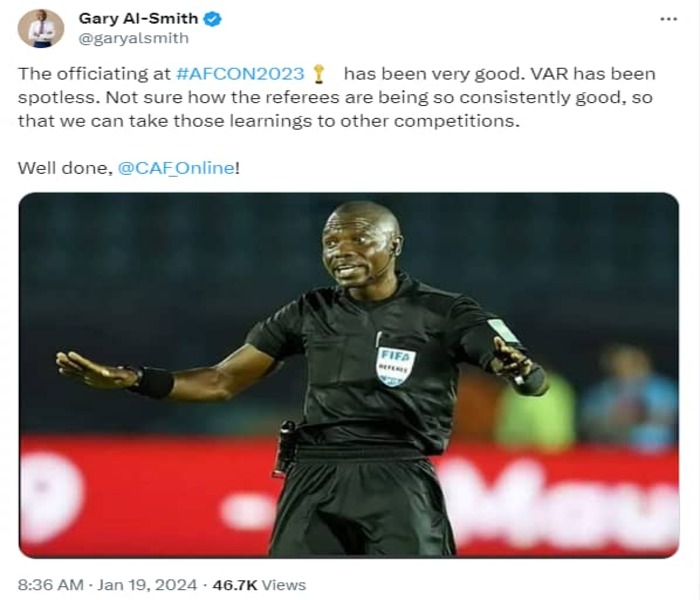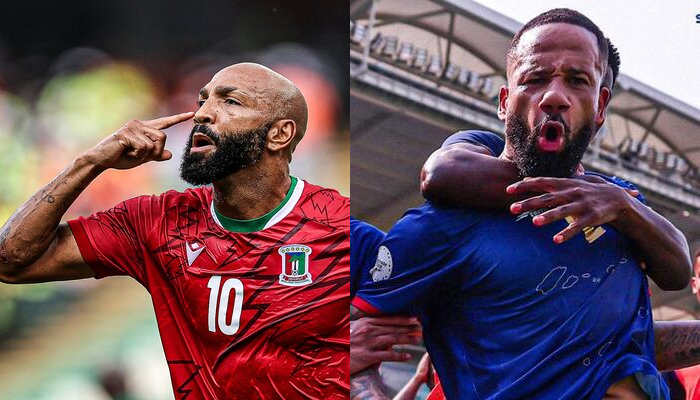By Samuel Egyir-Hagan, Pan-Africa Football contributor
What a glittering start it has been! The AFCON has certainly lived up to expectation, and keep treating fans to great excitement. Players are giving their sweat and blood, the technical teams’ tweaks and orders from the touchline has made differences, then comes the unsung heroes and heroines- the referee body.
Mostly away from the spotlight in the absence of controversies, centre referees and their able linesmen always endure accusations of corruption, match-fixing, and verdicts of corruption, especially in the African setting.
However, this has been the opposite at the ongoing tourney. Online plaudits from fans and an absence of dissatisfaction from players and coaches during press conferences clearly shows the level of officiating.

Match officials participated in an Integrity Briefing held by the African football governing body, CAF, where they were lectured on possibilities of match manipulation ahead of the opening game of the tournament.

Match officials at the Integrity Briefing. Photo Credit: CAF
Of course, they are bound to make mistakes, which comes with the human nature despite the inclusion of VAR which is being used for the third time at the AFCON. This article serves to celebrate and motivate these officials who are playing a part to ensure we enjoy the best AFCON in years. To dissect their performances so far, here are key areas to be looked at:
Top Standard Officiating
A buttress to the points, match officials at the AFCON are making a case for themselves with brilliant reading of the game. With the African version of the beautiful game characterized by high-level energy, aggressiveness and quick changes of play, referees have been on top of their game as well with near-perfect calling of fouls, dishing out of cards, allocation of set pieces, and improved flow of play at the AFCON.
Officials have brought a certain ‘Calmness’ to the game, clearly visible in how most of the group stage games have played out.
Inclusiveness

Rwanda’s Salima Mukansanga became the first female center official at the Africa Cup of Nations in the 2021 edition, taking charge of the group stage match between Zimbabwe and Guinea. She is joined by four other female officials at the 2023 edition.
AFCON 2023 has recorded the highest number of female officials (five) for a men’s tournament on the continent, a testament to the ongoing agenda of inclusion, promotion and involvement of females in football in Africa.
Female officials at the tournament may already sound like household names, with football lovers acquainted with few such as Akhona Makalima (South Africa), Salima Mukansanga (Rwanda) and Karboubi Bouchra (Morocco).
FIFA certified, with years of experience in the bag, female officials’ duties at the AFCON ranges from VAR Assistance to on-field refereeing.
For doubters, who belittle the potential these ladies bring to the field, Mukansanga officiated at the 2022 FIFA World Cup in Qatar, and was the first woman to officiate at the Africa Cup of Nations, having led an all-woman officiating team at the 2021 edition.
Same goes for Bouchra, a FIFA standard referee since 2016, who became the first Arab female referee to officiate a professional men’s tournament final, the Moroccan Throne Cup in 2022. Makalima who has experience from the South African top division Premier Soccer League, and FIFA Women’s World Cup serving as a VAR official. Diana Chikotesha (Zambia) was the assistant referee in the blockbuster clash between Ghana and Egypt. Finally, Rivet Maria Pakuita Cinquela (Mauritius) was also on VAR responsibilities with skills gained from serving as the fourth official for the 2022 Women’s AFCON final and officiating women’s football matches at the Tokyo 2020 Olympics.
Communication
Both in-terms of on-field and with the VAR room, communication has been seamless at the AFCON. Noticeable interference of signals and battery changes has been here and there, but a look at the human side of communication sees referees receive an ‘A+’. Assistant referees receive decisive prompts on offside calls and fouls and center referees are playing advantage on potential fouls to aid the flow of the game. Even the fourth officials input with substitutions, prompting of fouls and cautioning of technical benches has been spot on.
In spite of the language barrier, officials also maintain great understanding with the players right from the tunnel, to the coin toss with captains and all the way to the final whistle.

After consulting with his Video Assistant Referee (VAR) crew, Libyan referee Ibrahim Mutaz sent off Guinea’s François Kamano for a dangerous challenge against Cameroon
Proper Adhesion to Time
Adhesion to time has been great at the AFCON. The inclusion of cooling breaks after every twenty-five minutes as well as additional time due to VAR checks, substitutions, injury treatments and goal celebrations is well accounted for. As the tournament heads into round three which will see simultaneous matches and high possibility of extra time and penalties in the knockout stages, it remains hopeful that keen adherence to time will be standardised which involuntarily aids security, global audience views and more.
Education
Additionally, match officials are doing a great job in the continuous education of players and technical teams at the ongoing AFCON which is rubbing off on the fans as well.
Despite the majority of players competing at top levels, it might sound funny to note that not all of them are well acquainted to the changes for the 2023/2024 season applied by the International Football Association Board (IFAB), the organization that regulates how the Laws of the Game are implemented.
Cautions of fouling arising from set pieces, informing a player who is deliberately offside in a bid to confuse the goalkeeper during free kicks of his stance, warning to players who commit minor fouls and deploy time wasting tactics, and even entrance into the field during substitutions are ways the officials are contributing to this cause.
Physical and Mental Fitness

Cooling breaks in the hot conditions of Ivory Coast have been a focus of the refereeing crews at the 2023 Africa Cup of Nations.
Hats-off to the centre and assistant referees for maintaining high levels of physical and mental fitness throughout the course of the ongoing tournament.
As earlier mentioned in the style of African play, the game involves fast transitions across all squares of the pitch, leading to referees running helter-skelter in the blazing heat typical to the January-February periods of the west African climate.
It’s safe to say that despite VAR at hand, the officials do not want to miss a bit of the action. Sprints in 90+ minutes of counter attacks and keeping up with pacey wingers by the linesmen and lineswomen deserves praise.
This is also displayed in their mental balance as they do not resort to dishing out matching orders as the game gets heated.
Conclusion
If the level of integrity, intelligence and ethics continues for the rest of the tournament, be assured to experience games similar to the 2022 World Cup final.
Also, with such high standards maintained at the end of the AFCON and in other CAF competitions (Club and National), there will certainly be a significant increase in referee allocation for Africa at the 2026 FIFA World Cup.





